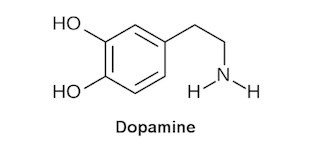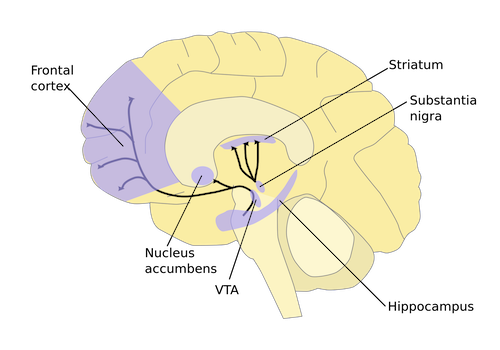Dopamine, also called hydroxytyramine, a nitrogen-containing organic compound formed as an intermediate compound from dihydroxyphenylalanine (dopa) during the metabolism of the amino acid tyrosine. It is an amine synthesized by removing a carboxyl group from a molecule of its precursor chemical L-DOPA, which is synthesized in the brain and kidneys.

Dopamine has been coined the “motivation molecule” and functions as a neurotransmitter, primarily by inhibiting the transmission of nerve impulses—in the substantia nigra, basal ganglia, and corpus striatum of the brain. The brain includes several distinct dopamine pathways, one of which plays a major role in reward-motivated behavior. Most types of reward increase the level of dopamine in the brain. Other brain dopamine pathways are involved in motor control and in controlling the release of various hormones. These pathways and cell groups form a dopamine system which is neuromodulatory.

Dopamine Nature
Symptoms of Poor Dopamine Activity
- Inability to self-motivate
- Inability to start or finish tasks
- Feelings of worthlessness
- Feelings of hopelessness
- Lose temper for minor reasons
- Inability to handle stress
- Anger and aggression while under stress
- Desire to isolate oneself from others
- Unexplained lack of concern for family and friends
Symptoms of poor dopamine activity include poor motivation or drive, feelings of worthlessness and hopelessness, loss of temper for minor reasons, inability to handle stress, and a desire to isolate from others. The dopamine-deficient person tends to be non-compliant due to lack of motivation.
Dopamine is most commonly known for its association with Parkinson’s disease, a disease brought on by destruction of the brain’s substantia nigra, where dopamine is made, and long-term dopamine deficiency. However, dopamine has numerous functions in the brain related to motor coordination, motivation, and reward.
Dopamine helps regulate prolactin, a hormone involved with lactation, reproduction, and libido. It is involved with modulating mood, attention, and learning, and drives the pleasure center of the brain.” and is heavily involved in addiction.
For the average American a dietary lack of dopamine is not an issue. In fact many people are overconsuming foods rich in dopamine and serotonin precursors. However, because so many other issues are at play in a dopamine deficiency, dietary consumption of foods high in the amino acid phenylalanine are not typically effective with the exception of vegan and vegetarian diets.
The factors that can hamper dopamine activity include medications, insufficient cofactors due to nutritional deficiencies, blood sugar imbalances, and hormonal imbalances.
Two popular antidepressants affect dopamine pathways and are categorized as dopamine selective reuptake inhibitors (DRIs). A positive response to these drugs is a strong indication that dopamine activity is compromised. As with the use of SSRIs for serotonin-related depression, DRIs can eventually deplete the body of important cofactors necessary for dopamine synthesis and activity, as well as create a resistance to dopamine.
Phenylalanine is a precursor to dopamine. It’s transport across the blood-brain barrier depends on proper liver function and blood sugar balance for transport by the “large neutral amino acid transporter” (LNAA) proteins.
THB, the byproduct of folic acid that is produced by healthy gut bacteria, is necessary for the production of dopamine. Gut infections and insufficient healthy gut flora can hamper the brain’s production of dopamine. Vitamin B6 is another cofactor necessary for dopamine synthesis and vitamin B6 deficiencies are very common these days.
The breakdown and clearance of dopamine requires magnesium and methyl donors. A severe magnesium deficiency may hamper this breakdown and clearance; you see magnesium deficiencies in those taking diuretics, a first-line therapy for high blood pressure. Athletes who over train can become deficient in magnesium also. Methyl donor deficiencies are also common today.
Anemia, which starves the brain of sufficient iron and oxygen, can hamper the production of dopamine. This could help explain why people with anemia experience such symptoms as loss of motivation and depression.
Factors that affect dopamine transportation and synthesis:
- Medications
- Insufficient cofactors due to nutritional deficiencies
- Iron deficiencies
- Blood sugar imbalances
- Hormonal imbalances
The herbs and nutrients that directly stimulate dopamine synthesis include:
- Mucuna pruriens
- D, L-phenylalanine
- Beta-phenylethylamine (PEA)
- N-acetyl L-tyrosine.
Additional cofactors and support nutrients include:
- Vitamin B6 (P-5-P)
- Selenium
- Blueberry extract
- Alpha lipoic acid
- S-Adenosyl l-methionine (SAM-e)
- Magnesium
